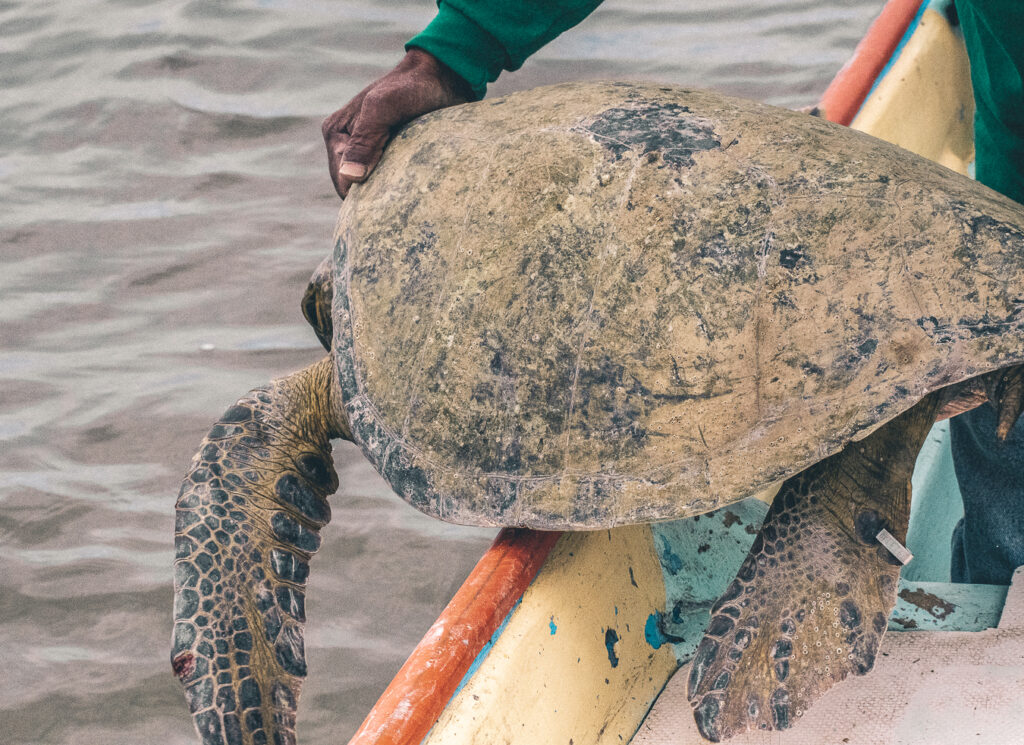Article by Stephanie J. Rousso
A new scientific discipline engages the intersection of our brain with our only one Mother Ocean. Neuro-conservation is an emerging field, proposed and led by Dr. Wallace J. Nichols, the author of Bluemind. Nichols scientifically explains how water heals us and empowers our creativity, happiness, and compassion for life. Dr. Nichols also founded Grupo Tortuguero de Las Californias (GTC), a non-profit sea turtle network in Northwest Mexico.
Nichols’ work inspired my current PhD research that feeds into my new business venture: Blue Turtle Sustainable. My research aims to continue the legacy Nichols started by working with remote artisanal fishing communities to protect sea turtles. Native and indigenous fishers from the Mexican state of Sinaloa help me collect data on sea turtle bycatch. ‘Bycatch’ is the term used when species other than the target are accidentally captured in fishing gear.
Due to the growing issue of unregulated bycatch, five species of sea turtles in the eastern Pacific are considered endangered in Mexico and either vulnerable, endangered, or critically endangered internationally. The main reason being entanglement in fishing gear, hooks, ropes, and nets. Estimates suggest that over 60 percent of seafood imports into the US and Canada originate from Pacific Mexico. If you watched SeaSpiracy, you know the doomed outlook on our ocean. Yet, it is not the entire story. Many small coastal communities, like the ones I am privileged to collaborate with, are taking initiatives to heal our only one Mother Ocean.
Before bycatch became an issue, many of the fishermen I work with were former sea turtle poachers. Yet, the GTC program opportunities have changed them from poacher to protector. My PhD research and business take a novel and innovative approach: to empower coastal communities in ocean conservation with alternative economic opportunities through responsible travel and seafood. We can still eat delicious seafood, (including vegan option seaweeds) packed with omega 3, while supporting coastal communities who are making a positive difference.
My PhD research aims to study the bycatch data collected by fishers, create maps of “hotspots” (high density interactions between sea turtles and fishing gear), and identify refuges for sea turtles. In these turtle refuges, fishers will self-monitor and employ best fishing practices by using circle hooks, traditional fishing nets, and reduced soak times, all of which reduce bycatch. To offset an economic loss, we are creating a specialty seafood market with premium prices and educational materials to consumers. We are even working with fishers and chefs to sustainably harvest edible seaweeds and create delicious omega 3 packed vegan/vegetarian products. Taking the neuro-conservation approach, we want people to feel good about their seafood choices knowing that their purchase is supporting ocean stewardship, seafood transparency, and proving new opportunities for ocean sustainability for the next generation.

We are rolling out our Pachamama Seafood Market in La Paz, Mexico, a fabulous nature travel destination. With every purchase, we include information about our research and the ocean stewardship of the Indigenous and artisanal fishing communities. We are also promoting travel experiences for conservation tourists and academic groups. The groups participate with fishers as citizen scientists to measure, weigh, photograph, tag, and release the sea turtles. Each sea turtle receives a name, and we send the information as an adoption certificate to each traveller/student.
My passion is ocean mindfulness, which plays with Dr. Nichols’ neuro-conservation principles. Before releasing each sea turtle back into the ocean, I lead a guided meditation for compassionate healing for ourselves, the turtles, the fishers, and the ocean. We are reminded of our oneness, connected through one drop of seawater, and to move forward with awareness for this connection through breath. Afterall, sea turtles are reptiles with lungs living in a marine habitat. Each breath is intentional, so can each of our inhales and exhales be intentional for collective healing with our only one Mother Ocean.
Stephanie J. Rousso, MS, is a marine ecologist, yoga addict, neuroscience junkie, and oceanpreneur. You can follow her progress and support her work by signing up for her newsletter at www.BlueTurtleSustainable.org. She is currently seeking board members and conservation travel and academic groups. If you would like to donate field equipment and supplies to support her research, please contact her team at [email protected] for a current wish list of gently used or new items. Namaste.

